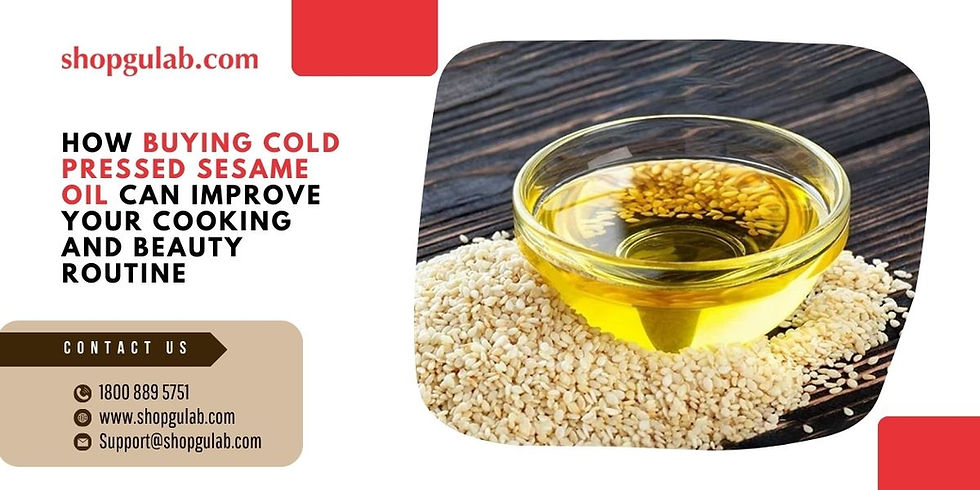Smart Shopping: Unveiling the Factors Behind Extra Virgin Coconut Oil Prices
- Nov 18, 2023
- 3 min read
In the realm of wellness products, Extra Virgin Coconut Oil (EVCO) stands out for its multifaceted benefits and extensive uses. However, the intriguing aspect lies in the diverse pricing of this elixir. Let's delve deeper into the intricate web of elements that influence the price of Extra Virgin Coconut Oil (EVCO).
What Sets EVCO Apart?
EVCO distinguishes itself by undergoing a unique extraction process that retains maximum nutritional value, setting it apart from other coconut oil varieties. Its richness in lauric acid and natural antioxidants contributes to its health-promoting attributes, fueling its popularity in health and beauty spheres.
Understanding Price Factors
The heart of EVCO pricing lies in the realm of quality. The nuances of the production process, from sourcing coconuts to the methods of extraction, significantly dictate the final cost. Additionally, the allure of packaging aesthetics and the reputation of the brand often elevate the price spectrum.
Quality Standards in Extra Virgin Coconut Oil
Discerning high-quality EVCO entails scrutinizing certifications like USDA Organic, Fair Trade, or Non-GMO Project Verified. These markers serve as indicators of authenticity and adherence to stringent quality benchmarks.
Production Processes and Price Variations
The dichotomy between cold-pressed and expeller-pressed EVCO delineates not just the quality but also the pricing spectrum. While cold-pressed oils maintain maximum nutrients, they often come at a premium. On the other hand, expeller-pressed options offer a more affordable alternative without compromising significantly on quality.

Packaging and Branding
The visual appeal of well-packaged EVCO coupled with the prestige of a reputable brand can substantially hike up prices. While some premium brands justify their costs through superior quality, others inflate prices solely on brand recognition.
Market Trends and Price Fluctuations
EVCO prices sway in response to external factors like weather conditions affecting coconut harvests, geopolitical changes impacting import/export logistics, and the dynamic dance between global supply and demand.
Cost-Benefit Analysis
Balancing the price against the quality and long-term benefits of EVCO is crucial. While higher-priced oils often promise superior quality, a thorough analysis of the holistic benefits aids in justifying the investment.
Consumer Tips for Smart Shopping
Navigating through the plethora of options necessitates savvy strategies. Seeking budget-friendly yet high-quality alternatives is feasible by exploring lesser-known brands or opting for bulk purchases. However, it's imperative to watch for red flags such as excessively low prices that might compromise on authenticity and quality.
Factors Influencing Extra Virgin Coconut Oil Prices
The Complexity of Quality Standards
Quality standards in Extra Virgin Coconut Oil (EVCO) extend beyond certifications. While labels like USDA Organic or Fair Trade indicate a certain level of quality, the sourcing of coconuts, the extraction process, and the conditions in which they are grown play a pivotal role. Factors such as the maturity of coconuts at harvest, the extraction machinery used, and the storage conditions post-extraction all contribute to the oil's final quality and, consequently, its price.
Delving Deeper into Production Processes
The dichotomy between cold-pressed and expeller-pressed methods represents a spectrum rather than a binary choice. Within each category, variations exist based on the degree of heat applied, the pressure exerted during extraction, and the filtration process. This nuanced approach significantly impacts the oil's flavor, aroma, and nutritional composition, thereby influencing its price point.
Environmental Impact and Sustainability
Consumers increasingly prioritize sustainability and ethical practices when purchasing EVCO. Brands committed to eco-friendly farming practices, fair wages for farmers, and minimal environmental impact often invest more in these endeavors, which reflects in the product's cost. Moreover, the use of sustainable packaging materials also contributes to the overall pricing.
Global Dynamics and Market Trends
EVCO prices are not insulated from global economic factors. Fluctuations in currency exchange rates, shifts in international trade policies, and geopolitical tensions can all affect the pricing of this commodity. Moreover, as consumer awareness and demand for EVCO grow worldwide, this surge in interest can influence pricing due to supply and demand imbalances.
Health and Wellness Trends
The burgeoning health and wellness industry heavily influences EVCO pricing. As more scientific studies emphasize the health benefits of consuming EVCO, the demand for high-quality oil surges. This increased demand often results in price hikes, especially for premium-grade oils known for their exceptional quality and nutritional content.
Ethical Branding and Marketing Strategies
Brands leveraging meticulous marketing campaigns emphasizing ethical sourcing, community support, or social responsibility often reflect these values in their pricing. Consumers willingly pay a premium for brands that align with their ethical principles, further influencing the price spectrum of EVCO.

Conclusion
Understanding the intricate web of factors driving Extra Virgin Coconut Oil pricing empowers consumers to make informed choices. By unraveling the significance of quality standards, production methods, branding, and market dynamics, individuals can make astute purchases aligned with their health and financial considerations.
Shop and Save Big – Your Wallet Will Thank You!








Comments